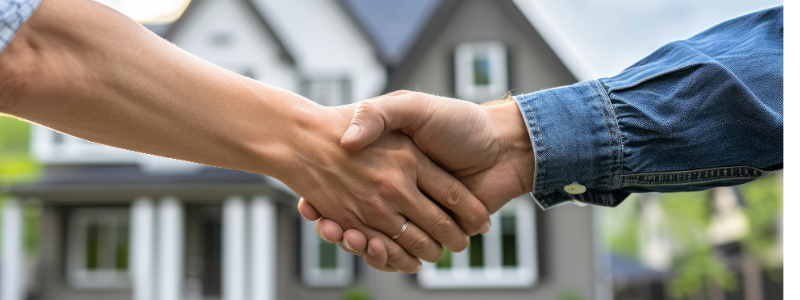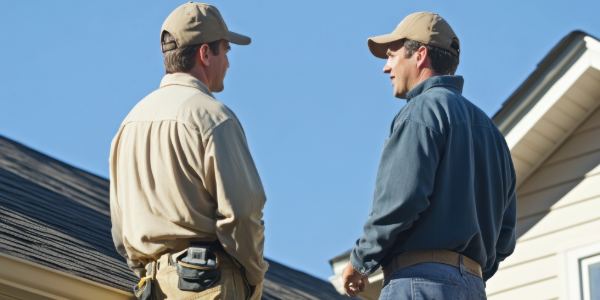What Is Off-Page SEO?
Off-page roofing SEO refers to all the activities conducted outside your website that impact your rankings on search engine results pages (SERPs). Unlike on-page roofing SEO, which focuses on optimizing content and structure within your website, off-page SEO strengthens how others perceive your website’s trustworthiness and authority.
Think of your website as a house. On-page SEO is about making sure the house is well-built, with solid walls and a sturdy roof. Off-page SEO, on the other hand, is like the neighborhood your house is in. It’s about making sure the surrounding area is desirable, safe, and well-regarded. This includes activities like building high-quality backlinks, earning local citations, and gathering positive reviews.
📈 Check out our Roofing SEO Overview to plan your next moves.
For roofing contractors, off-page SEO is particularly beneficial. It helps build a strong reputation in local communities and ensures your business shows up for high-value search terms. When potential customers see your business frequently mentioned in reputable sources, it builds trust and makes them more likely to choose your services.

Why Off-Page SEO Matters for Roofing Contractors
Given how competitive local markets are becoming, roofing businesses must leverage off-page SEO to rank higher in Google Maps and organic search results. Imagine a homeowner searching for “roofing contractor near me.” If your business doesn’t appear in the top results, you’re missing out on potential leads. This is where off-page SEO efforts come into play.
Off-page SEO techniques like earning authority with links, managing online reviews, and securing local citations significantly boost your E-E-A-T (Experience, Expertise, Authoritativeness, Trustworthiness), which are major ranking factors. Roofing contractors who consistently show up on directories and earn positive mentions on external platforms gain a serious edge in lead generation. Without strong off-page signals, even the best roofing website may struggle to gain traction in search engines and improve the website’s authority and the site’s reputation.
Focusing on an off-page SEO strategy ensures your business ranks higher and appears more credible and trustworthy to potential customers. This dual benefit of improved visibility and enhanced reputation can lead to more inquiries and ultimately more roofing jobs.

Key Off-Page SEO Strategies for Roofing Contractors
Now that you hopefully understand the importance of off-page SEO, let’s explore specific strategies for roofing contractors. These off-page SEO plays will help improve your search engine rankings and ensure your business stands out.
From link building to optimizing your Google Business Profile, each strategy plays a crucial role in boosting your online presence. Let’s explore these strategies in detail.
Link Building
Link building is the process of acquiring hyperlinks from other websites to your own, which signals trust and relevance to search engines. For roofing contractors, this means pursuing direct links from:
- Industry-specific directories
- Home improvement blogs
- Supplier websites
- Local media outlets
Avoid black-hat link-building tactics which can greatly jeopardize your ability to rank. The goal is to build quality backlinks that enhance your site’s credibility and visibility.
Natural backlinks arise when other websites recognize the value of your content and link to it without solicitation. This can be achieved by creating valuable content that others want to reference, such as roofing guides, tips, and industry insights. Maintaining a consistent link-building strategy ensures your roofing business gains authoritative links that boost your search engine rankings.
Google Business Profile Optimization
A fully optimized Google Business Profile (GBP) helps roofing contractors appear in the “local pack” and dominate local searches. This involves including:
- Up-to-date business information
- Specific roofing services offered
- Service areas
- Hours of operation
- High-quality images.
To boost your profile’s engagement and improve your business visibility, consider the following strategies:
- Highlight recent projects.
- Promote seasonal roofing services.
- Share customer reviews through GBP posts.
- Consistently respond to questions and reviews to demonstrate that your business is active and trustworthy.
These actions help improve your search visibility and attract more clients.

Online Reviews and Reputation Management
Reviews on platforms like Google, Yelp, and industry sites act as reputation signals off-site, shaping local search rankings and influencing customer decisions. Roofing contractors should proactively request reviews from satisfied customers and make it easy to leave feedback (short links, QR codes, follow-up texts).
A steady stream of recent, positive reviews builds social proof and can lift visibility for high-intent queries like “roofing contractor near me.” Equally important, respond to negative reviews promptly and professionally—acknowledge the issue, offer a resolution, and move the conversation offline when needed—to demonstrate integrity and rebuild trust.
Local Citations and Directory Listings
Local citations are online listings of your business’s name, address, and phone number (NAP) on third-party websites. Local businesses should submit accurate NAP info to reputable directories such as local business:
- Angi
- HomeAdvisor
- BBB
- Yelp
- Houzz.
Consistency across all listings strengthens your business’s local SEO and prevents search engine confusion by reinforcing citations and geo-relevance. Building citations on niche home-service directories enhances industry relevance and corroborates your service areas. Accurate, consistent listings across multiple directories help improve local search rankings for roofing contractors.
Social Media Signals and Engagement
Social media is playing an increasingly important role for roofing companies and engagement on platforms like Facebook, Instagram, and LinkedIn contributes to brand visibility. Sharing before-and-after photos, customer testimonials, and roofing tips can increase social shares and drive referral traffic.
Roofing contractors that build a strong presence on social platforms see improved brand recognition and enhanced online authority. Google considers brand mentions and user engagement on social channels as indirect ranking signals, which can boost your google rankings and search engine rankings more broadly.
It is important to remember to engage with users on social platforms in the form of comments, replies, likes etc. This helps build trust and can be a big differentiator from the roofing company down the street who does not engage.

Content Marketing & Guest Posting
Contributing roofing tips and insights to home improvement blogs or local news sites can earn authoritative backlinks and expand your reach. Additionally, publishing guest posts on reputable industry websites helps build thought leadership and SEO value at the same time.
Creating shareable roofing content such as “how-to” guides, seasonal checklists, and storm damage FAQs can attract external links. Collaborating with influencers in the home renovation space can get your content in front of broader audiences.
Common Off-Page SEO Mistakes to Avoid
Buying backlinks from low-quality websites can result in penalties that harm your rankings rather than help them. Inconsistent business information across citations confuses search engines and weakens local authority. Neglecting online reviews—or failing to respond to negative ones—can damage your reputation and reduce trust with potential customers on reputable websites.
Measuring Your Off-Page SEO Success
Track key metrics like domain authority, referring domains, citation consistency, review volume, and star ratings across platforms. Use tools like Ahrefs, Moz, SEMrush, Google Search Console, and BrightLocal to monitor your backlink profile and local SEO performance. If you don’t have experience using these tools consider hiring an outside expert who can open your door to strategies to grow your business.
Set clear goals like acquiring 5 new quality backlinks or increasing Google reviews by 20% in 60 days. Evaluate which strategies deliver the highest ROI and adjust your off-page SEO campaigns accordingly, focusing on your target keyword.
Final Tips and Best Practices
Focus on building long-term partnerships and brand trust rather than quick wins through black-hat SEO. Make off-page SEO a continuous part of your marketing strategy, not a one-time effort.
Combine off-page efforts with on-page optimization and technical SEO for a holistic approach. Consistent investment in off-page SEO often leads to higher conversion rates, better lead quality, and improved search visibility for roofing contractors.
Summary
Off-page SEO is a powerful tool for roofing contractors looking to improve their online presence and generate more leads. By focusing on strategies like link building, optimizing your Google Business Profile, managing online reviews, and engaging on social media, you can enhance your business’s visibility and credibility.
Remember, off-page SEO is not a one-time effort but a continuous process. Consistently applying these strategies will yield long-term benefits, helping your roofing business grow and succeed in a competitive market. If you lack the time or expertise, consider outsourcing your roofing SEO needs to an expert and see the results firsthand.
Frequently Asked Questions
What is off-page SEO?
Off-page SEO encompasses activities outside your website that influence search engine rankings, including link building, managing online reviews, and social media engagement. These factors are crucial for enhancing your website’s visibility and authority.
Why is off-page SEO important for roofing contractors?
Off-page SEO is crucial for roofing contractors as it enhances their online presence, builds reputation, and increases local search visibility, ultimately leading to more leads. Prioritizing off-page strategies will significantly benefit your business.
How can I optimize my Google Business Profile for better SEO?
To optimize your Google Business Profile for better SEO, ensure that all business information is accurate and current. Highlight your services and service areas, and regularly post updates while engaging with customer reviews. This approach enhances visibility and builds trust with potential customers.
What are some common off-page SEO mistakes to avoid?
To enhance your off-page SEO strategy, avoid purchasing backlinks from low-quality websites, ensure consistency in business information across citations, actively manage online reviews, and conduct regular audits of your backlink profile to mitigate potential penalties.
How do I measure the success of my off-page SEO efforts?
To effectively measure the success of your off-page SEO efforts, focus on key metrics such as domain authority and the number of referring domains, while utilizing tools like Ahrefs and Google Search Console to monitor your performance. Consistent tracking of these parameters will provide valuable insights into your overall effectiveness.
Introduction
Customer reviews are more than just words on a screen; they are a powerful tool for improving your roofing company’s SEO. Each time a customer leaves a review, they contribute fresh content to your online presence that is often seen by many. This not only builds trust but also strengthens your local search visibility and increases click-through rates.
When potential customers see positive reviews or a higher rating overall, they’re more likely to click on your website, leading to higher traffic and better rankings in search engine results. The combination of trust-building and roofing SEO benefits makes customer reviews an invaluable asset for any roofing business looking to grow.
📈 Check out our Roofing SEO Hub to plan your next moves.
How Customer Reviews Impact Roofing SEO
Customer reviews provide fresh, keyword-rich content that search engines love—and because Google treats reviews as a local ranking factor, those testimonials can reinforce relevance for the terms homeowners actually use.
When customers mention phrases like “roof repair,” “roof replacement,” or “storm damage,” these keywords naturally enhance your SEO without extra effort. That’s the power of leveraging customer feedback effectively.
Star ratings also play a significant role in improving click-through rates (CTR). When your listing appears in search results with a high average rating and strong review count, it attracts more clicks—leading to more calls and website visits. This not only boosts visibility but also increases your chances of converting visitors into customers.
Moreover, reviews strengthen local SEO signals. Google considers the volume, recency, and quality of reviews when ranking businesses in the Local Map Pack. Positive, recent reviews improve your credibility with homeowners and signal to search engines that your business is reliable and trustworthy.

Optimizing Google Business Profile with Reviews
Incorporating customer reviews into your Google Business Profile is crucial for enhancing your visibility in local search results. Not only is obtaining positive reviews important but making sure you practice review management inside GBP. In other words respond to reviews, even the bad ones and try and make things right with the reviewer. When prospective customers search for roofing services in your area, reviews can make your business stand out, providing the social proof needed to convince them to choose your services over competitors.
Best Practices for Getting Reviews
To encourage satisfied customers to leave reviews, consider the following steps:
-
- Ask for reviews immediately after completing a project when their positive experience is still fresh in their minds.
- Provide direct links via email, text, or QR codes to make the process easier.
- Incorporate reminders for customers to leave feedback to facilitate the review process.
Consider sharing review links through thank you messages or on receipts to encourage customer participation. Follow-up emails after service completion can also be effective in prompting customers to leave reviews.
Best Practices for Responding to Reviews
Responding to every review shows that you value customer feedback. Here are some tips for responding effectively:
-
- Thank happy customers.
- Address any concerns in negative reviews. This can help dampen concerns for others.
- Use keywords naturally in your responses, such as “roof repair in [city],” without sounding spammy.
This approach not only helps with SEO but also builds trust with potential customers, creating an opportunity for lasting relationships through search engine optimization and connection.
To manage reviewed reviews effectively:
-
- Keep reviews flowing consistently, as recency matters more than one-time volume.
- Engage with reviews regularly to signal to potential customers that their opinions are valued.
- Acknowledge both positive and negative feedback publicly to enhance customer trust and improve your credibility through practice.
Leveraging Reviews Across Your Website
Adding reviews to service pages can build trust where customers make decisions. For example, placing testimonials on a page dedicated to roof repair or roof replacement helps potential clients feel more confident in choosing your services.
Transforming positive customer experiences into detailed case studies with project images can further enhance your web websites’ credibility for the user. These stories not only explore your expertise but also allow potential clients to discover a clear image of what to expect.
Using schema markup helps Google display star ratings in search results, improving your visibility. Additionally, linking reviews internally to service or project pages can boost SEO signals and guide users through your site more effectively.
Encouraging More High-Quality Reviews
A systematic approach to requesting reviews can significantly enhance the quantity and quality of feedback received. Engaging with customers promptly after a service experience increases the likelihood of receiving a review, making it essential to have a well-thought-out process in place.

Timing and Process
Timing is crucial when asking for reviews. To maximize the chances of obtaining a review:
-
- Request feedback immediately after project completion or inspection.
- Make the review process easy for customers by providing direct links.
- Keep the steps to a minimum.
Allow customers sufficient time to reflect on their experience before requesting feedback. This ensures that the reviews are thoughtful and detailed, which can be more valuable than quick, superficial comments.
Multi-Channel Approach
Requesting reviews through multiple channels increases the likelihood of receiving feedback. Ask for reviews in person, via follow-up emails, and through SMS reminders. The more convenient you make the process to write, the higher the response rate will be.
Utilizing diverse communication channels enhances customer engagement and increases access to the audience chances of receiving reviews. This multi-channel approach ensures that you reach customers in a way that is most convenient for them.

Also consider new channels to drive reviews such as third-party review sites and citations which can have an overall positive impact on domain authority and in turn rankings.
Building a Review-Friendly Culture
Consistently delivering excellent service naturally encourages positive reviews. Train your team to politely ask for reviews as part of the customer handoff process. By integrating review requests into daily interactions, you create a culture that values customer feedback and encourages more reviews.
Creating a positive customer experience leads to organic and enthusiastic reviews. When customers feel valued and satisfied, they are more likely to take the time to leave detailed and positive feedback that has been created.
Turning Reviews into Marketing Assets
Sharing standout reviews on social media platforms like Facebook, Instagram, and LinkedIn can amplify their reach and impact. These reviews serve as powerful testimonials that can attract new customers and publish target potential clients in the industry.
Featuring video testimonials on your website, YouTube channel, and in ads campaigns adds authenticity and credibility to your marketing efforts. Videos content is highly engaging and can significantly influence potential customers.
Highlighting customer quotes in brochures, newsletters, and emails can enhance your marketing materials. Additionally, incorporating a written outline of reviews into local PR efforts can support award submissions, community involvement, or press coverage, further boosting your business’s headline reputation.
Common Mistakes to Avoid
Buying or incentivizing reviews can damage your credibility and lead to penalties. Authenticity is key, so focus on earning genuine reviews through excellent service.
Ignoring negative reviews can make your business appear unprofessional. Addressing issues directly and constructively demonstrates that you value customer feedback and are committed to appearing improving your services.
Keyword stuffing in responses can feel spammy and detract from the authenticity of your engagement. Keep your replies natural and focused on addressing the customer’s answers experience.
Building Authority Takes Time
Building authority through customer reviews and SEO takes time and consistent effort. The difference in SEO results is that they are not immediate; they require months of steady work and engagement, often spanning many hours of page search engine optimization. Crawl patience and persistence are crucial.
Focus on quality over quantity when it comes to reviews. A few detailed, authentic reviews can be more impactful than dozens of vague ones. Commit to ongoing engagement by continually requesting, responding to, and promoting reviews for lasting benefits.
Summary
Customer reviews are a powerful tool for improving your roofing business’s SEO. By leveraging reviews strategically, you can enhance your online presence, attract more local clients, and build trust with potential customers. From optimizing your Google Business Profile to turning reviews into marketing assets, every step contributes to a stronger SEO strategy.
Implement these practices consistently and patiently, and you’ll see the long-term benefits of a robust review strategy. Start today and watch your roofing business soar to new heights.
Frequently Asked Questions
How do customer reviews impact roofing SEO?
Customer reviews significantly enhance roofing SEO by offering fresh, keyword-rich content and improving click-through rates through star ratings, ultimately strengthening local SEO signals. This makes them vital for attracting potential customers and boosting online visibility.
What are the best practices for getting reviews?
To effectively obtain reviews, ask satisfied customers for feedback immediately after project completion. Provide direct links via email or QR codes, and incorporate reminders to encourage their response. This proactive approach enhances the likelihood of receiving positive reviews.
How should I respond to reviews?
Responding to reviews is essential; thank satisfied customers and thoughtfully address any concerns raised in negative feedback. This approach fosters engagement and demonstrates your commitment to customer satisfaction.
How can I leverage reviews across my website?
You can effectively leverage reviews on your website by adding them to service pages, converting feedback into compelling case studies, utilizing schema markup for star ratings, and linking reviews internally to enhance your SEO. This approach will not only improve user trust but also boost your site’s visibility.
What common mistakes should I avoid when managing reviews?
To effectively manage reviews, avoid buying or incentivizing them, ignore negative feedback, and refrain from keyword stuffing in your responses. Emphasizing authenticity and constructive engagement will enhance your credibility.
Introduction
In today’s competitive digital landscape, roofing companies need more than traditional marketing to gain visibility. Ranking well in local search results is critical for attracting new business. Backlinks—an important ranking factor in Google’s algorithm—can significantly enhance your search performance.
In this guide, you’ll discover how to attract backlinks the right way to build trust, drive traffic, and improve your search rankings—positioning your roofing business as a trusted authority in your area.
📈 Check out our Complete Roofing SEO Framework to plan your next moves.
What Is Roofing SEO?
Roofing SEO centers on optimizing your website to rank for keywords like “roof repair” or “roof replacement” within your service area, with the aim of generating qualified local traffic and leads. But roofing businesses face particular challenges: seasonal demand leads to fluctuating search interest, competition is fierce, and often there’s limited content to optimize. That means a strategic, focused SEO approach is crucial.
Effective SEO also involves delivering useful content that answers your customers’ questions—helping your rankings and building trust, so you’re the go-to choice over rivals.

Why Backlinks Matter for Roofing SEO
Backlinks are essentially recommendations from other sites—they boost credibility and help search engines recognize your site’s value. The more high-quality backlinks you have, the better your chances of ranking well.
Especially in roofing, a robust backlink profile can be the differentiator between showing up on page one or getting buried deep in search results. Even with strong on-page optimization, the strength of your backlinks may be what allows you to outpace competitors.
However, not all links are equal—reputable sources are far more valuable than many low-quality links. A single backlink from a respected industry site can outperform multiple from lesser places.
Types of Backlinks That Matter Most
-
High-authority backlinks from respected industry or news sites are powerful trust signals.
-
Local backlinks from directories, chambers of commerce, or local news help solidify your local SEO.
-
Niche-relevant backlinks from construction or home improvement sites carry more weight than generic links.
-
Avoid toxic backlinks—spammy or irrelevant links can harm your SEO, so regular cleanup is important.
Proven Ways to Earn Backlinks for Your Roofing Business

Create Valuable, Shareable Content
Produce blog posts that homeowners find genuinely helpful, like “How to Spot Roof Damage After a Storm.” Use visuals—infographics, checklists, case studies, or before‑and‑after photos with local keywords—to boost engagement and linkability. Storytelling also helps your content resonate emotionally and get shared more often.
Get Listed in Local and Niche Directories
Submit your business to:
-
-
Roofing-specific directories
-
Trusted platforms such as Yelp, Angie’s List, and the Better Business Bureau
-
Also, claim and optimize your Google Business Profile—consistency in your NAP (Name, Address, Phone) across all listings is key for local search accuracy.
Partner with Local Businesses and Organizations
Sponsor community events or charities in exchange for website mentions and backlinks. Collaborate with suppliers or subcontractors—perhaps through testimonials or case study features—to build reciprocal link opportunities.

Pitch Guest Posts and Contribute to Industry Blogs
Write well-researched, valuable content for home improvement or contractor blogs—not overly promotional pieces—to earn backlinks and referral traffic. Tailor your pitches to align with each site’s style and audience. Cultivating relationships with blog editors can open doors for future collaboration.
Use Press Releases and Local Media Outreach
Share noteworthy business news—such as new hires, awards, or community work—via press releases to attract media coverage and relevant backlinks. Using strategic keywords and multimedia (images, infographics) can boost visibility and SEO impact.
How to Monitor and Protect Your Backlink Profile
Use tools like Ahrefs, SEMrush, or Google Search Console to keep track of new and lost links. Performing regular audits helps you spot and remove harmful links using Google’s Disavow Tool. Monitoring also helps you seize new link-building opportunities quickly.
Common Backlink Mistakes Roofers Should Avoid
-
Buying backlinks—this can lead to Google penalties and long-term damage.
-
Over-optimizing anchor text—repeating the same keyword link too often looks unnatural. Vary your anchor text for a natural profile.
-
Ignoring relevance—links from unrelated sites can dilute your authority or even harm SEO. Stick with roofing, home services, and local sources.
Building Authority Takes Time — Be Patient and Consistent
Gaining domain authority through backlinks is a marathon, not a sprint. Expect results to take several months. Always prioritize quality: one strong backlink from a reputable site can outperform many mediocre ones. Consistency in content and outreach pays off in sustainable authority and search visibility.
Summary
Successful roofing SEO hinges on a healthy backlink profile. By earning high-quality links, you’ll improve rankings, boost traffic, and grow your business. The road to authority is gradual, but with patience and a focus on value, the payoff is well worth the effort.
Frequently Asked Questions
Why are backlinks important for roofing SEO?
They signal trust and authority to search engines, helping improve rankings and visibility.
What types of backlinks should roofing businesses focus on?
Prioritize high-authority, local, and niche-relevant backlinks while steering clear of toxic or irrelevant ones.
How can I create content that attracts backlinks?
Produce shareable content like blog posts, infographics, and case studies that answer homeowner questions and resonate with your audience.
What tools can I use to monitor my backlink profile?
Use Ahrefs, SEMrush, or Google Search Console to track and audit your backlinks.
What common backlink mistakes should I avoid?
Avoid buying links, overusing the same anchor text, and getting links from irrelevant or low-quality sites.
